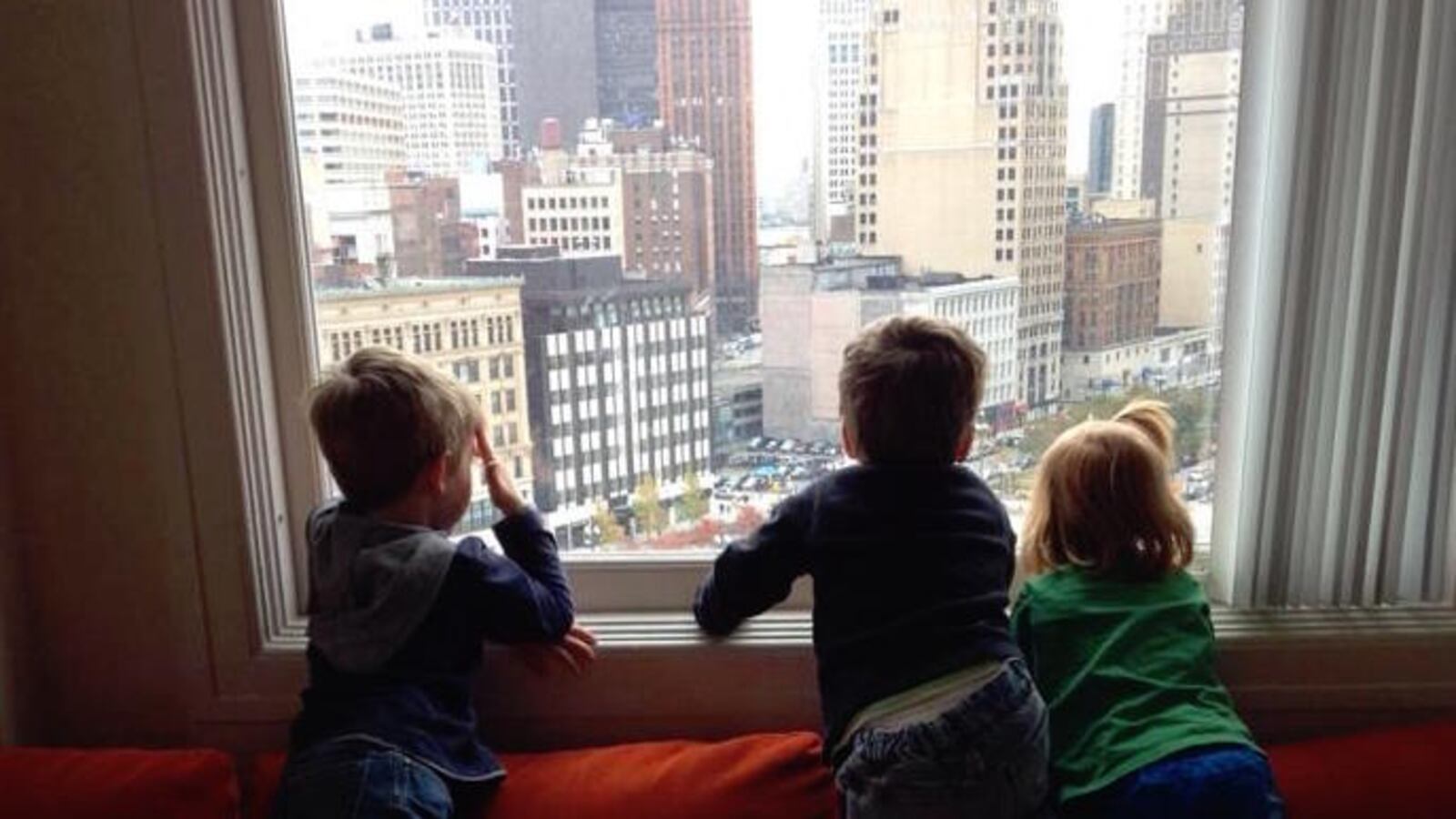Chalkbeat is launching in Detroit. As we kick off an extended conversation about schools in the city, we want to introduce ourselves. Here, get to know Erin Einhorn, our founding reporter. Also: Meet Julie Topping, a longtime Detroit resident and former Detroit Free Press editor who has joined us as our editor. And CEO Elizabeth Green explains why we’re putting down roots.
In the two and a half years since my husband and I sold our cramped Brooklyn apartment and moved with two small children to downtown Detroit, we’ve been confronted with the same question — over and over (and over) again.
“You live in Detroit?” we’re asked, as eyes widen and brows furrow. “And you have kids?”
It’s not the living in Detroit that’s the issue, obviously. Plenty of people are moving to Detroit from places like Brooklyn these days, drawn by the city’s charm and authenticity, its low cost of living, and the exciting opportunity to be part of a city’s transformation.
But it’s one thing to come here and celebrate as abandoned buildings fill with lofts and bars and boutiques. It’s entirely another to deliberately bring two children into a city known to have some of the worst schools in the country. And that’s why we get so many questions from friends, relatives, even strangers — and why sometimes those questions come layered in judgment.
“I’d love to live downtown,” several suburban parents have told me. “But, you know, I have kids.”
Never mind the fact that there are 140,000 children living in the city of Detroit. The people who ask these questions seem to think we’re bad parents — as if choosing to live in an interesting, diverse, and historic city like Detroit is somehow an act of parental neglect.
I’m not going to lie. The implication rankles.
“The next time someone asks me what we’re going to do about schools, I’m going to spit it back in their face,” my husband ranted last summer. “I’m going to ask where they send their kid that they think is so great.”
As he sees it, suburban schools look better on paper because they enroll middle-class children, mostly white, who decades of research have concluded will do better on tests than poor students no matter what kind of school they attend.
Many suburban districts near Detroit have overcrowded classrooms, cookie-cutter teach-to-the-test instruction, and financial problems that are a leading reason why schools across the state have been declining for decades.
My husband and I are not delusional. We know that Detroit schools face intense challenges.
As a reporter for Chalkbeat Detroit, I wrote about the Detroit teachers and families who, in a federal lawsuit last year, alleged deplorable conditions in local schools.
I covered the near-bankruptcy of Detroit’s main school district, which last year had debts so severe it needed $617 million from the state to stay afloat. The money kicked off a contentious political battle in Lansing that ended, most local school supporters say, with little more than short-term solutions. Not addressed are the problems that created the debt in the first place — plunging enrollment, crumbling buildings, and a teacher shortage so extreme that some schools have had to put 40 or 50 students in a classroom.
But perhaps the most alarming thing I’ve written is a story about why education groups with money and ideas are steering clear of Detroit: They don’t see anyone doing much of anything to fix systemic problems.
“What I commonly hear people say is ‘I don’t see a plan,’” a top national researcher told me. “I don’t see people coming together with a coordinated strategy that’s going to improve conditions there.”
So my husband and I know that our curious friends are asking a reasonable, well-informed question when they inquire about our plans for school. But here’s the thing: It’s the wrong question — and it’s being asked of the wrong people, because my family is going to be absolutely fine.

We have luxuries that are not available to the vast majority of families in Detroit. We have a car and accommodating jobs that enable us enroll our kids in any school in any neighborhood — options that poor transportation and the uneven distribution of schools have put out of reach for far too many kids.
We have the time and resources to vet schools, to ask questions, to know that we have choices beyond whatever school happens to be nearby.
And we have what we realize is the very essence of privilege: We can opt out. Private school would be a stretch for us, both financially and philosophically because we truly believe in public education. But the option remains if we need it.
For the record, we don’t need it. At least not yet. Though it is more than a little unsettling to know that our five-year-old will start kindergarten soon in such a troubled school system, we have promising prospects — a dual language school where kids can learn to read English and Spanish at the same time, a notably diverse charter school that lets kids dive deeply into subject areas, a new public Montessori program, and a small, high-quality elementary school that’s so close to our home, our kids could walk there alone by the second grade.
We remain confident that we’ll find the right fit. But the fact remains that most Detroit children will not find a spot in a quality school. And that’s the problem I wish I were hearing about from my curious friends — not what am I going to do about school for my kids, but what are we all going to do about the fact that our schools are in crisis?
I don’t have the answers — none of us do — but I think a first step toward finding them is changing the question.

